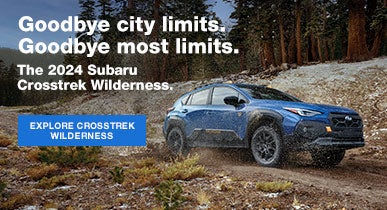Thursday, 02 July, 2020
Camping 101: How To Camp With Your Subaru Forester
Are you planning a camping trip this summer? When you are ready to head out in your Subaru Forester – or any vehicle — to experience the great outdoors, here are some tips to help get you and your gear organized and packed for the trip.
First, you need to plan your camping trip. Where are you going and for how long? What are you going to eat, drink and do while you are there? Will you be renting a cabin or roughing it in a tent? These things are all necessary to figure out ahead of time so you can have the experience of a lifetime without the stress. Here are some great camping spots near Louisville.
Every camping trip requires a campsite and some sort of shelter — unless you plan on sleeping under the stars (with the mosquitoes.) If you’re doing the cabin thing, it’s a lot easier because you just need to remember your gear – and there’s no need to lug along a tent or other equipment that goes along with roughing it. If you are going the cabin route, be sure you know what is included with the cabin, so you know what extra items you need to bring with you (i.e. does the cabin have electricity, stove, shower, beds, etc.)
If you have a Subaru Forester, you’re in luck! There’s plenty of room in the back for you to make a bed/sleeping area – especially if you put an air mattress in the back.
(Image Source: Lunolife.com)
Most formal camping areas have some sort of restroom facilities available. However, if you’re going to be really roughing it, you want to bring a small shovel to bury your morning constitutional. A shovel can also be handy to help put out your campfire, bust up firewood, or a variety of other uses. Small “military surplus” style folding shovels with extendable handles are great for camping because they are easy to pack and stow and are durable for shoveling needs. Here’s another top tip – bring along some rolls of toilet paper, too. It not only makes your daily duty more comfortable, it can be a great fire starter as well.
Speaking of fires, every campsite needs a good camp fire. Please don’t bring wood with you. You should source your firewood (purchased or gathered) near your camping area. Hauling in firewood can introduce pests and diseases to new areas and can quickly spread problems. You’ll also want to bring matches or a lighter and a hatchet or strong camp knife to split some kindling off of your firewood.
When you go camping, be sure to bring a flashlight or lantern of some sort. Make sure you have fresh batteries or the proper fuel – because those things always seem to run out just when you need them the most. If you’re counting on using your phone as your light source, be sure to bring your mobile phone charger. Also, keep in mind that when you get out into wilderness areas, cell phones spend a lot of energy searching for a signal and the batteries tend to go down fast.
When going on your camping trip, be sure to bring along a good supply of water. You’ll need water to drink and you can’t always count on the quality of water that might be available at the camping site. You will also need water to wash your hands regularly, and you may need to wash dishes or rinse out a wound (and you remembered the first aid kit and soap, right?) You’ll also need water to douse your campfire when you are done roasting marshmallows.
Sunscreen and insect repellant are also necessities when you go camping. A large-brimmed hat and sunglasses are also a good idea, and you may want some sunburn lotion as well. If you’re spending a lot of time outside, even hazy days can lead to sunburn. And don’t forget your lips, be sure to pack a lip balm with sunscreen.
Depending on how long you plan to stay, you’ll need a toiletries kit with toothpaste, toothbrush, soap, and towels. Pack some clothes and extra shoes, especially if you are spending a day hiking – a fresh pair of shoes will feel much better the next morning. And if you can’t survive a morning without your coffee or tea, remember to pack some instant coffee, tea and a pan to heat water in…and don’t forget a cup to drink it from!
If you plan on cooking while you are camping, be sure to bring the necessary cooking supplies along. That may include a camp stove, pans, marshmallow roasting forks, plates and eating ware, a cooler and leftover food storage containers (zipper-type bags work great!) Bring a handful of trash bags — they have a ton of uses that range from garbage to serving as an emergency rain poncho to storing wet/dirty clothes until you get home. You can also use a tightly-twisted trash bag as a short piece of rope
Top Tip: Stow your food in airtight containers and keep them safely stowed in your Subaru Forester. This will help keep pests away from your campsite and prevent night time raiders like bears or raccoons from eating your food. For the same reason, tie up your trash bag and keep them in the car at night or when you’re away from your campsite.
Regardless of what you need to pack for your camping adventures, check out the full line of Subaru accessories made just for your Forester. All-weather car mats and cargo liners will protect your Forester from mud, dirt, trash and spills. The cargo organizer and cargo net will keep your small items tidy and easy to find. You can just open the gate and find what you need quickly and easily. And of course, the Aero Bar roof rack system allows you to easily mount Thule rooftop carriers for your kayaks, bicycles, paddle boards, or watertight lockable carriers for your regular cargo.
Check out Neil Huffman Subaru in Louisville to see what other accessories are available for your Forester and your active lifestyle. We can even install your accessories for you!

















